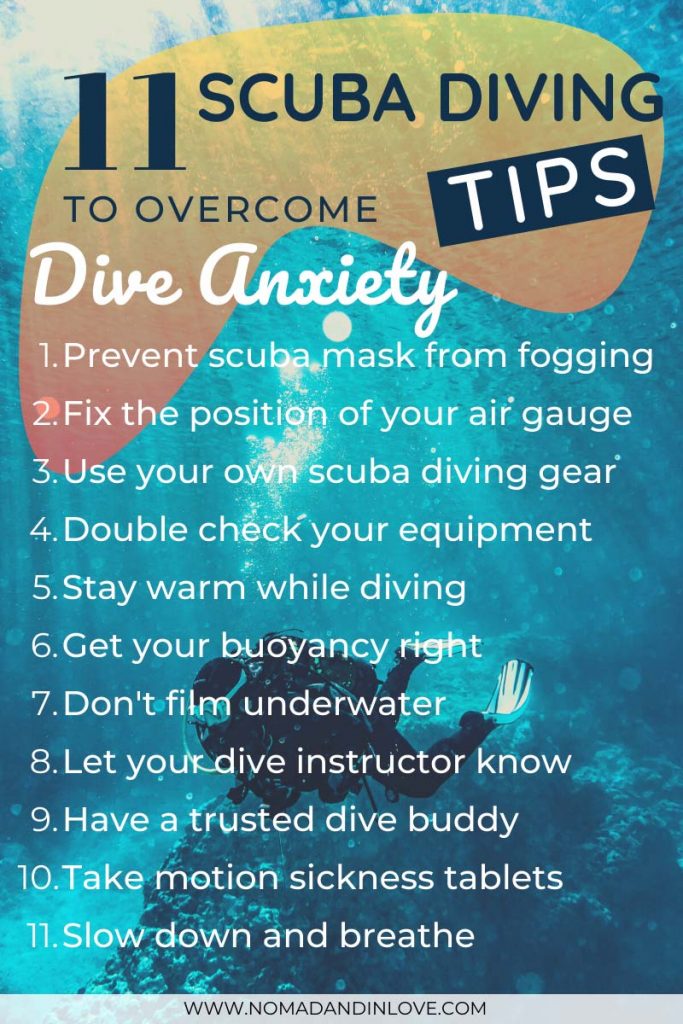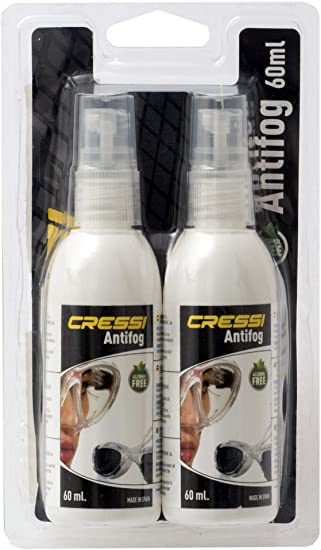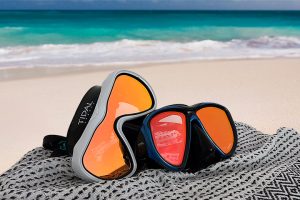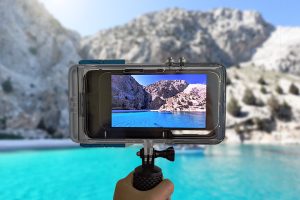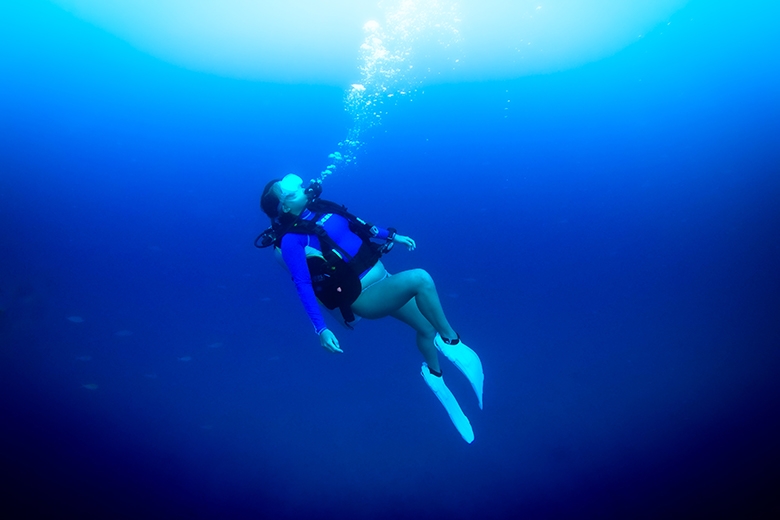
Useful scuba diving tips we’ve learnt after completing 100+ dives that will help you overcome diving anxiety and panic underwater.
People who scuba dive generally fall into two categories. Those who immediately feel comfortable and confident scuba diving. And those who panic and have diving anxiety.
We just happen to fall into each side of the spectrum with Michael being the ‘merman’ and Chloe, well… A fish out of water?
Whichever category you fall in, breathing from a tank underwater isn’t exactly the most natural experience. So don’t feel bad if you also feel nervous and anxious about scuba diving.
The key is to know your triggers and finding ways to manage them. If you don’t know where to start, learn from our personal experience and try these scuba diving tips.
Diving Anxiety: My Personal Scuba Diving Story
You’d think that only people who are uncomfortable in water would have diving anxiety. But that’s simply not true.
I’ve personally never had a problem with water. I started swimming at a young age and am actually a pretty strong swimmer.
I managed to easily complete all the swimming tests for the PADI Open Water Certification without a hitch.
I’ve also had no prior history of claustrophobia or anxiety issues. So you can imagine my surprise the first time I experienced what I can only call claustrophobia during our PADI Open Water exercises.
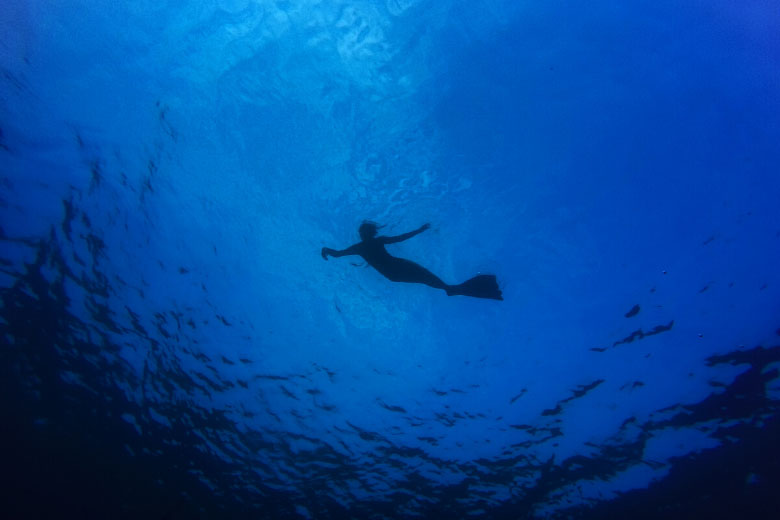
My Underwater Claustrophobia Experience
I still remember the moment vividly from 6 years ago. It was our first scuba diving experience outside of the pool. Our dive group of 10 were kneeling on the bottom of Bass Lake in Johannesburg. Waiting for our turns to take off our scuba masks, put it back on and clearing the water out so we could open our eyes again.
Sounds pretty simple in theory. But try doing this when you’re 6 meters (or 2 storeys) underwater and it’s a complete different story.
The water was cold. It was dark and there was absolutely nothing to see underwater besides each other. I knelt there patiently waiting for my turn when suddenly it felt like darkness was closing in. My inner voice interrogates me and asks, ‘What am I doing underwater where I don’t belong?! Get the hell out of here! NOW!’
And the panic sets in. I felt like I couldn’t breathe so I started breathing faster which only made it worse. Of course, one of the lessons they teach you when getting scuba diving certified is to always breathe in and out deeply so you can pull sufficient air through the valves, regulator and into your lungs. But your brain doesn’t exactly refer to textbooks when you’re in the midst of a panic attack.
Luckily I managed to make my way to the dive instructor and remembered sufficient hand signals to let him know that I couldn’t breathe and needed to surface immediately. His first response was to give me his emergency regulator so I could breathe while he figured out what was wrong. When he saw that I still had air in my tank and that my regulator worked, he looked at me and realised that I was experiencing underwater claustrophobia.
As an instructor, he’s obviously seen this happen before so he tried to calm me down by holding my hands and helping me focus on breathing in and out slowly. I tried my best to follow his instructions, but because I reached out to him too late, I was beyond ‘saving’ at this point and all I wanted was to get out of the water.
He quickly realised this and slowly we surfaced the water together. We were only 6 meters deep, but it literally felt like an eternity getting to the surface. And for some reason, I had lost my sense of orientation and I couldn’t tell which way was up or down. I was paralysed by fear and all I was able to do was kick in the direction my instructor was pulling us towards.
When we finally got out of the water, I was shaking and gasping for breath. It took me a good 30 to 40 minutes to eventually return to my senses. I felt terrible. Not only from the experience itself but also because I had prematurely ended my group’s dive session.
How I Overcame Diving Anxiety
Luckily I was with an amazing bunch of people and they only showed me kindness and support. I don’t think I would have completed my Open Water Certification that weekend if it weren’t for their encouragement.
I thought I would never scuba dive again after experiencing diving anxiety. But I managed to overcome it slowly, dive after dive.
Even after 100+ dives, I can’t say that my diving anxiety has completely gone and will never return. Sometimes I still feel it especially during my first dive after a long hiatus. But over time I’ve learnt some scuba diving tips and tricks to help manage my diving anxiety.
I’m sure there are others who have also felt nervous, fearful and anxious about scuba diving. That’s why I’m sharing my personal strategies and tips so you can hopefully overcome your diving anxiety too.
Strategies and Tips To Overcome Scuba Diving Anxiety
1. Stop Scuba Mask From Fogging Up
One of my top scuba diving tips for anxiety is making sure your scuba mask is always clear and doesn’t fog up. As you can imagine, having impaired vision underwater will dramatically increase your chances of going into a full blown panic attack.
This is especially true if you have a fear for clearing your scuba mask underwater like I do. I am so petrified to clear my mask, that I would rather scuba dive blind.
Yup – doesn’t make much sense I know, but fears and phobias usually don’t. I even go as far as to tell the scuba dive instructor and my fellow dive buddies that if they see me with a fogged up mask, to just let me be.
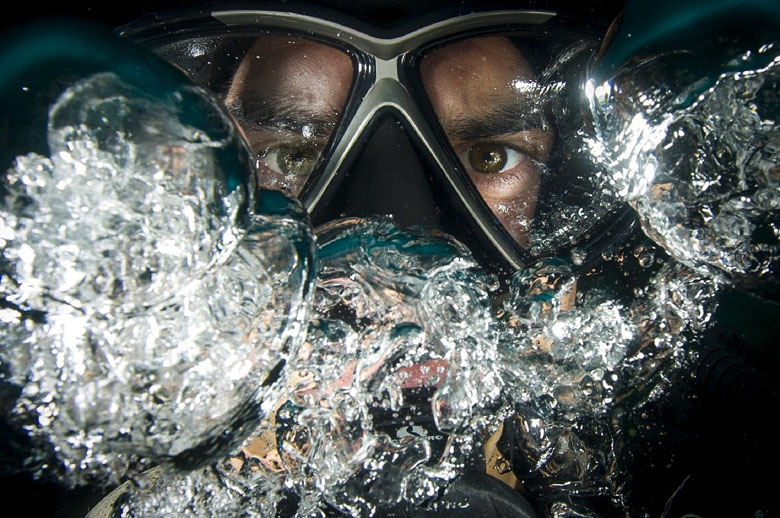
How To Prevent Scuba Mask From Fogging Up
There are a few methods you can try to stop your scuba mask from fogging up. A lot of experienced dive instructors like to use the toothpaste method. All you have to do is spread a layer of toothpaste on the inside and outside of your mask and leave it overnight. Then rinse it off before using.
Another method is to use anti fog spray. You can buy this on Amazon or at any dive shop. You just spray it on the inside of your mask, rub the liquid in and lightly rinse it off.
Make sure to only use a little bit of water for swishing around your mask to rinse it off. You don’t want to wash the liquid out entirely. Then shake your masks around a bit to get rid of excess water before putting it on.
I usually do the toothpaste ritual the night before and use anti fog just before we dive. It’s probably overkill but it’s a ritual I do. It helps calm my pre-diving jitters and it’s effective for preventing my scuba mask from fogging up.
Diving Masks with Anti-Fog Technology
Another way to stop your scuba masks from fogging up is by using specially designed anti-fog diving masks. We use these anti-fog diving masks by Tidal Masks.
These diving masks are designed with anti-fog films on the inner lens so you’ll never have to worry about your mask fogging again!
I also love that these unique diving masks come with red tinted lens. This helps balance out the blue color underwater so you can see how vibrant and colorful corals and other marine life are.
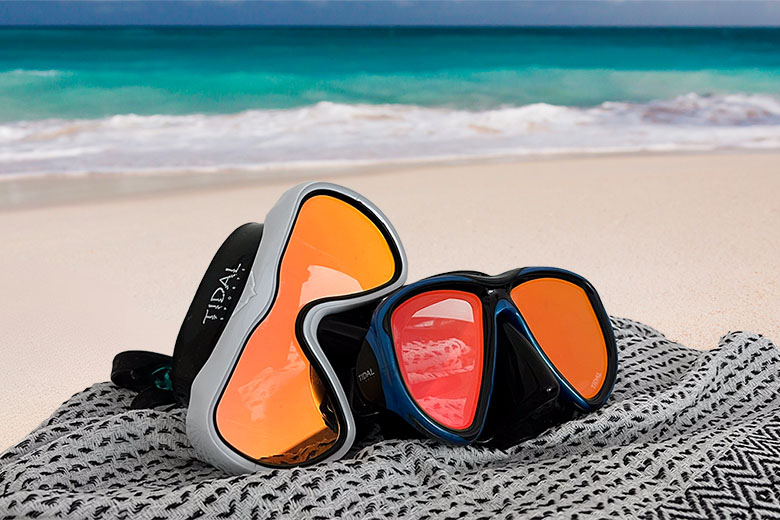
These anti fog diving masks are a little more expensive than your normal scuba masks. But totally worth the investment if you’re a nervous or anxious scuba diver (like me).
I recently used this mask diving in Koh Lanta (Thailand) and I had no problem with fogging AT ALL! It gives me such peace of mind and one less thing to be anxious about.
Find out how they work and how long their anti fogging ‘super power’ lasts in our Anti Fog Scuba Mask Review.
2. Fix The Position Of Your Air Gauge
Another practical scuba diving tip I use when I feel oncoming diving anxiety is checking my air gauge. I do this to remind myself that there is nothing to worry about as long as I have enough oxygen in my tank.
But this tip only works if you can easily find your air gauge without floundering around underwater trying to locate it. The solution? Fix your air gauge somewhere easily reachable so you don’t panic when you can’t find it.
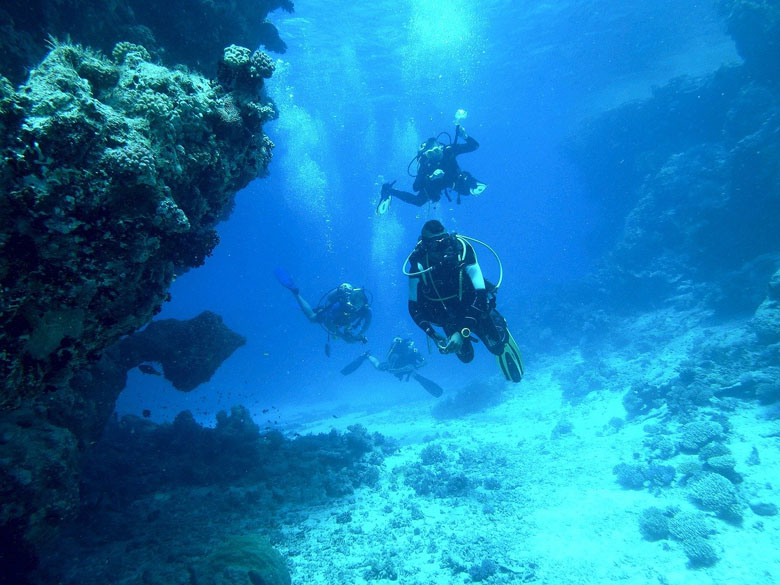
Photo by: Andreas Schau
I like to fix my air gauge against the left side of my body where I can easily find and reach it. You can easily do this too.
When you’re getting your scuba gear and air tank on before diving, tuck your air gauge against your body and wrap the bottom, thicker strap of the BCD over the air gauge valve. This way you’ll know exactly where your air gauge is and can easily pull it out to check your air consumption usage.
Not only does it make finding your air gauge easier, it’s also a great tip for keeping streamlined so you don’t unknowingly damage any corals while scuba diving.
3. Use Your Own Scuba Diving Gear
Where possible, always use your own scuba diving gear. This will help eliminate an element of uncertainty when diving.
When you use your own scuba diving gear, it’s already adjusted to fit you and it’s usually more comfortable. Plus you know they work and won’t have to worry about the quality.
Buying scuba diving gear is expensive, but definitely worth the investment especially if you have diving anxiety. Our scuba diving tip is to invest in these items one by one as you save up for them.
We’d recommend buying a scuba mask, fins and a rash vest first. Then buy the other gear one by one later. For a full list of essential scuba diving gear to buy versus ‘nice-to-haves’ you can skip, check out our Scuba Diving Gear for Beginners Guide.
4. Double Check Your Scuba Diving Equipment
Some scuba diving centres let you set up your own gear before your first dive. After that they set your gear up for you so you can relax during your surface intervals before your next dive.
While I love this additional service and have never had any problems with gear being set up wrong before a dive. I still follow the PADI rules and double check that my scuba diving gear has been set up correctly for my own peace of mind.
It’s another great ritual and scuba diving tip to help manage diving anxiety. Before every dive, I make sure to check that the air valve is properly connected to the tank, that it’s open and that my BCD inflates and deflates properly. I also breathe two or three times through both regulators to make sure they’re in good working order.
It helps calm my nerves and reminds me (yet again) that my equipment is working and I don’t have to worry about it.
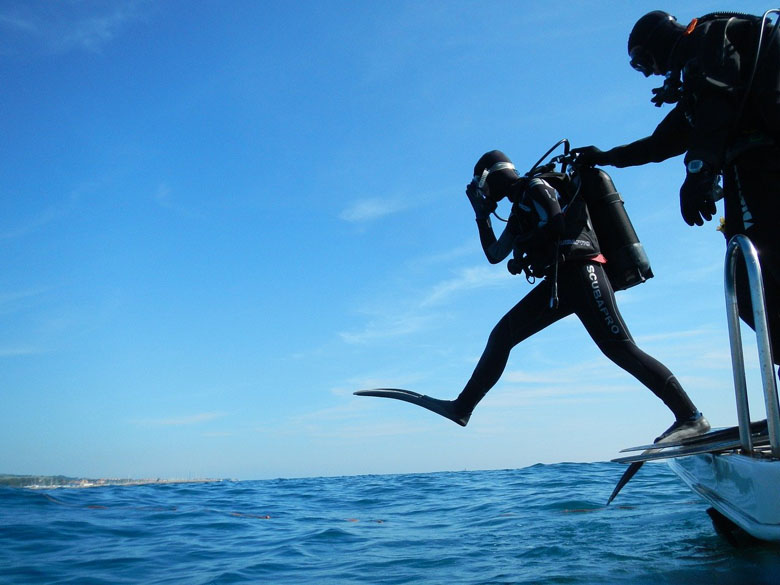
5. Stay Warm While Scuba Diving
Always take the ‘Goldilocks’ approach when scuba diving. This means that you should never feel too cold or too hot when diving. Feeling either too hot or too cold will cause discomfort and potentially trigger panic.
Our scuba diving tip is to make sure you’re dressed appropriately based on the water temperature and whether your body is more susceptible to hot or cold water.
For versatility, I have a 5mm wetsuit as well as a light rash vest. I usually use a rash vest when diving in warm tropical waters like in Mozambique or on a liveaboard around Thailand. The water temperature is usually higher than 26 degrees celsius so a wetsuit isn’t necessary.
I have a 5mm wetsuit as well which I must admit, I don’t use as often. That’s because most of my favourite scuba diving destinations tend to be in tropical places. But if you’re planning to dive in colder waters that are 20 degrees celcius and below (like in Cape Town, South Africa), you’ll definitely need a wetsuit.
Save Me For Later
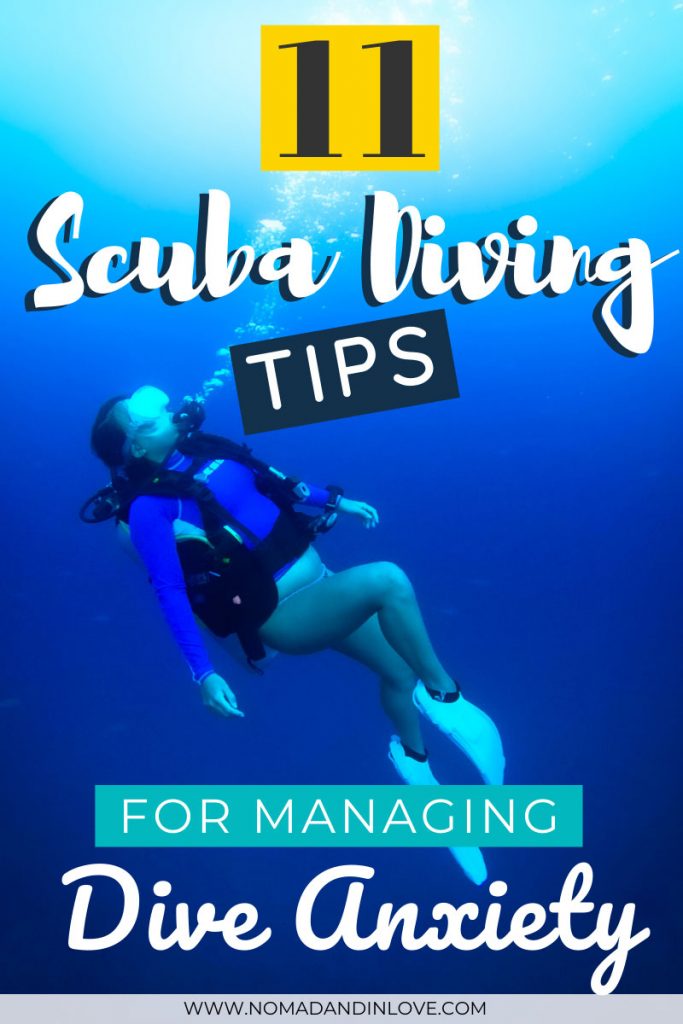
6. Get Your Scuba Buoyancy Control Right
Getting your buoyancy control right is so important, especially if you have diving anxiety. You don’t want to be too buoyant and risk floating to the top away from your dive group. Or risk being too heavy and feeling like a sinking ship.
It does take time and experience to perfect buoyancy control. But an easy-win to immediately improve buoyancy control is using the correct weights when diving.
In the beginning you won’t know yourself well enough to know what weight to use until you’ve done around 50+ dives. So the best advice we can give you is to ask your dive instructor.
Tell them what weights you’ve used on previous dives and whether it was salt or fresh water. They’re usually experienced enough to tell you whether that’s the right weight for you or if you need to adjust it.
Remember that your buoyancy will change depending on whether you’re diving in fresh or salt water, the thickness of your wetsuit, how much you weigh and other factors. So it’s always best to ask a dive instructor who is experienced and familiar with the dive site and conditions.
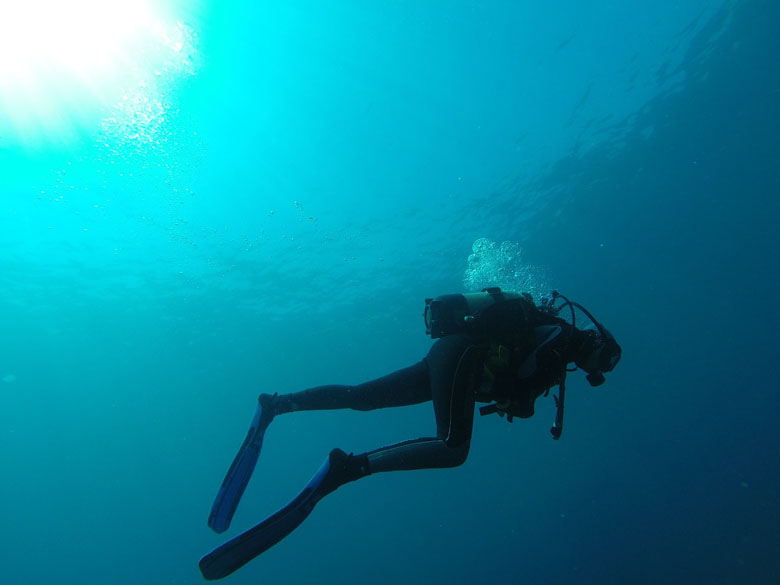
7. Don’t Film Or Do Underwater Photography
If you tend to have diving anxiety, it’s better to leave the underwater photography and filming to someone who is confident scuba diving. That will give you one less thing to worry about and eliminate another potential panic trigger.
Underwater photography and filming is also quite challenging. It looks easy when you’re watching other people do it on National Geographic or Animal Planet. But try doing it yourself and you’ll quickly realise how hard it actually is.
8. Let Your Scuba Dive Instructor Know
If you do have diving anxiety or feel nervous about scuba diving, let your scuba dive instructor know. That way they can keep an extra eye on you and respond if they see you struggling.
I usually mention it to my dive instructor just after he/she gives the dive briefing. I also make sure to mention my triggers (like clearing my mask) and what my coping mechanisms are.
If there are other ways they can help you when you panic, like holding your hands and helping you slow down your breathing, let them know so they can assist you if you do panic underwater.
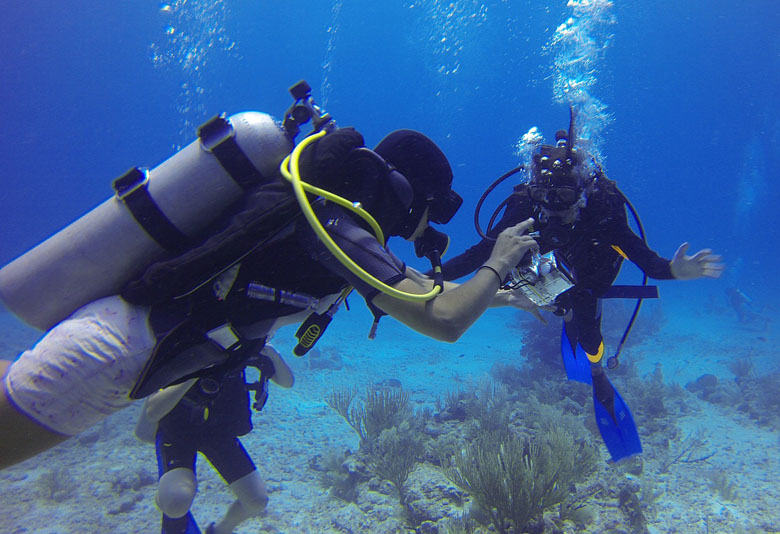
Photo by: Jacqueline Macou
Another good reason why you should let your dive instructor know, is that you can pair up with the instructor as dive buddies if your scuba group has odd numbers. That way you’ll feel more secure that you have someone experienced besides you.
Scuba dive instructors are some of the most friendly, kind hearted people we’ve met on our travels. So don’t be afraid to ask if you need help. They often share the best scuba diving tips that may help you overcome your fears and challenges.
9. Partner With A Trusted Dive Buddy
If you have a dedicated and trusted dive buddy, good for you. Having a dive buddy who is familiar with your triggers and knows how to comfort you underwater is priceless.
Luckily Michael is super comfortable scuba diving, so he’s the perfect dive buddy for me.
If you don’t have a dedicated dive buddy, don’t worry. You can always ask to partner up with your dive instructor if you have diving anxiety.
Related Guide: Looking to buy your dive buddy a scuba gift that is personal, affordable as well as travel- and eco-friendly? Check out our Gifts for Scuba Divers guide. We’ve listed 40 scuba diving gift ideas that cost less than $60.
10. Take Motion Sickness Tablets
Take motion sickness tablets before diving if you’re prone to motion sickness. It’s the worst feeling to be nauseous AND nervous before a dive.
Just make sure that the motion sickness tablet you’re taking is suitable for scuba diving. Some tablets make you drowsy and sleepy, which as you can imagine, is not the best combination for scuba diving.
11. Slow Down And Breathe
Our last scuba diving tip for anxiety is to remember to slow down and breathe. It’s very common to hyperventilate when you panic, but taking short, quick breaths is probably the worst thing you can do when you’re breathing from a tank underwater.
Trust me, I’ve done it before and I can vouch that what works on land does not work underwater.
Taking short, quick breaths underwater only means taking less oxygen into your body which dramatically increases anxiety. When this happens, try your best to remind yourself to breathe in and out deeply.
Look at your air gauge. Remind yourself that as long as you have enough oxygen, you are safe and there is nothing to worry about. Take deep breaths that make your belly expand (like the ones they teach in yoga).
Focus on something to distract your mind from the anxious feeling. I like to focus on my bubbles. When you breathe in and out slowly, your bubbles tend to be bigger. I focus on them and watch them gently float away to the surface. I find it beautiful and tranquil to watch, and most of the time I am able to calm myself down using this method.
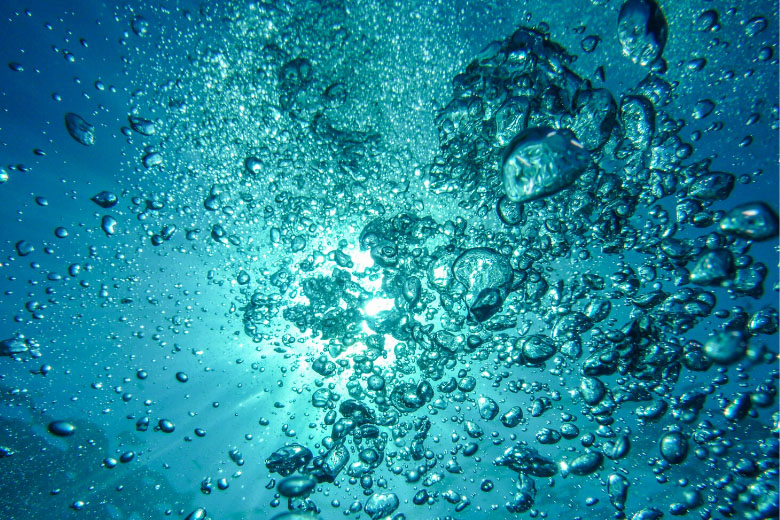
When you’re ready for the next step, focus on the colourful corals around you. Then move on to admiring the curious fish swimming around you.
How To Not Panic When Scuba Diving
Like most things in life. The more you practice these tips and tricks, the better you’ll get at managing your scuba diving anxiety.
After completing more than 100 dives, I’m quite happy to say that I’m almost 100% there in completely eradicating my underwater claustrophobia and diving anxiety. I hope that by sharing my own personal experience and scuba diving tips, that it can help others overcome their fear of scuba diving.
Remember that everyone’s triggers are different. So feel free to make adjustments or add your own anxiety-remedies to this list.
Scuba diving is one of the most liberating experiences you can have. We hope that more people can conquer their fears, learn to fall in love with the underwater world and by doing so, live a more conscious and sustainable lifestyle so we can protect our beautiful planet.
Related Guide: Do you love diving as much as we do? Get some inspiration on the best scuba diving destinations around the world in our Best Liveaboard Boats guide. We’ve rank the best scuba liveaboards around the world by price so you can easily pick your next diving destination according to your budget!
11 Scuba Diving Tips For Overcoming Diving Anxiety
If you need reminding, here’s a quick summary:
- Prevent your scuba mask from fogging up
- Fix the position of your air gauge
- Use your own scuba diving gear
- Double check your scuba diving equipment
- Stay warm while diving
- Get your buoyancy control right
- Don’t film or do underwater photography
- Let your scuba dive instructor know
- Partner with a trusted dive buddy
- Take motion sickness tablets
- Slow down and breathe
If you have your own scuba diving anxiety stories to share with us, we would love to hear them!
Save Me For Later
